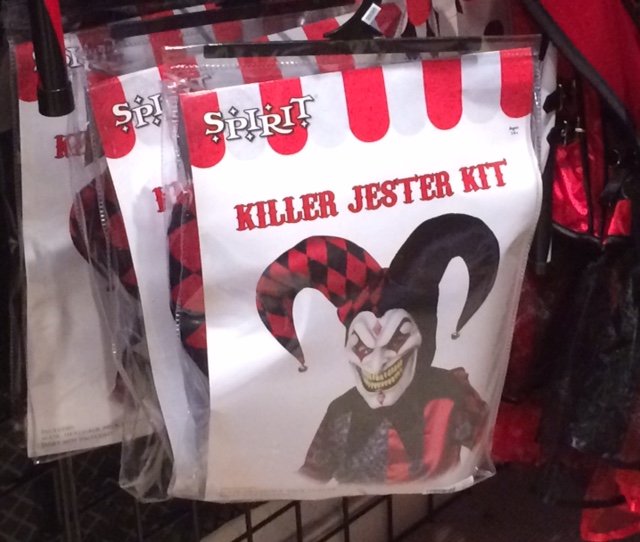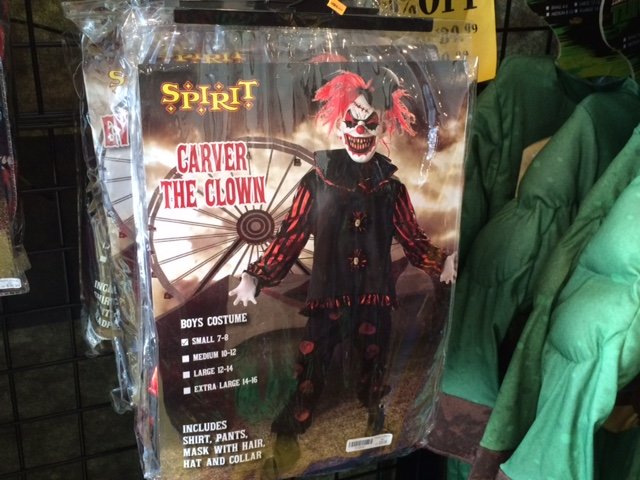
October 12, 2016
The recent hoax clown threats seen locally and around the world are likely to continue and may build through Halloween, according to a South Jersey psychologist.
“I think a lot of this is also an attempt at internet fame. Where you find a creepy clown, you will likely find someone with a video camera and a YouTube channel,” said Sean Duffy, a professor at Rutgers University – Camden.
“Clowns violate the boundary of physical reality by fitting a dozen in a tiny VW Beetle, or perform acts of magic and stunts that make them seem otherworldly," he said. "Otherworldly beings play by an entirely different set of rules.”
That’s exactly what worries Felony Strutter, the transgender name of a 43-year-old Philadelphian who was shopping last week for a few last-minute costume items at the Spirit Halloween store on Walnut Street in Center City.
“Every year it is a new thing, another thing to be fearful of. Now I have to watch out for clowns while I’m walking through the Gayborhood."
Already, crazed clowns – real, imagined and flat-out hoaxes – are challenging law enforcement and threatening the livelihood of legitimate clowns.
They are also a potential marketing moment for retailers – especially as Halloween nears.
At Masquerade, a large costume store in Center City, Eddy Manning said clown outfits remain a steady seller, with “normal” clowns outselling their creepy cousins.
“Clowns exist at the borderline of normal humanity. I think it is related to why in recent stories about creepy clowns, you find them hiding in woods, near schools and playgrounds, or creeping on porches in the middle of the night.” – Sean Duffy, professor, Rutgers University – Camden
But two other costumers – Pierre’s in Old City and ubiquitous Spirit Halloween – declined to comment on the demand for scary clown outfits, which some police departments have warned against wearing for trick-or-treating.
It's easy to see why authorities and parents alike are concerned about the seemingly daily headlines about "clown accounts" making social media threats against schools or a knife-wielding clown on the New York subway.
A recent social media threat in South Jersey's Williamstown "petrified" the 13- and 15-year-old children of Kim Corso, who was shopping Tuesday at the Spirit Halloween store in Center City.
Her children's school was placed on lockdown. There was a huge police presence. And there was nothing to it beyond the threat.
She researched the history of clown threats, then sat her kids down.
"You have to let your kids be kids, but you need to talk with them," said Corso, who finds it ironic that clown hoaxes appear centered largely in suburbs, not in tougher city neighborhoods, such as where she grew up in southwest Philly.
Sean White, a student in Center City, said he has not taken the reports seriously, but some classmates are scared.
Melanie Heinz of South Philly said for her two-year-old, "all clowns are scary to him."
Spirit Halloween sells many menacing clown costumes online and in stores.
In England, where the creepy clown phenomenon has spread, the Clowns International organization worries the livelihood of its members are at risk.
While the rise of social media clown threats seems new, the fears they bring to mind have been with us for decades, according to Duffy, who said clowns – even the friendly sort – are inherently creepy because they exist “in a certain psychological shadow world of moral ambiguity.”
“Clowns look human enough, but their exaggerated features make them seem uncanny – that they have abilities and features not shared by typical people,” he said.
Because they are masked, costumed and hidden beneath makeup – kinda human, kinda not – they are part of the “uncanny valley” theory, which applies to robots, animatronics, 3D animations – and clowns, Duffy said. The theory holds that the near-humanness of clowns initially elicits empathy, but that readily turns to revulsion.
The most extreme form of creepiness is the killer clown, a motif for 50 years and a common theme in movies, fiction and comics.
“Clowns exist at the borderline of normal humanity. I think it is related to why in recent stories about creepy clowns, you find them hiding in woods, near schools and playgrounds, or creeping on porches in the middle of the night,” Duffy said.
Duffy points out that pop culture is filled with killer clowns: Stephen King's Pennywise, Twisty from the series “American Horror Story” and the Joker and Harley Quinn from Batman.
Carver the clown is one of the menacing costumes sold by Spirit Halloween.
Anthony Gupta, shopping Monday for Halloween costumes, said college-age and mid-20s friends think the whole thing "is a freakout. It's crazy."
But he admitted he has friends who are dressing as the Joker and Harley Quinn because of a recently released movie featuring the clownish comic book super villains known as "Suicide Squad."
Those fictional killer clowns are, according to Duffy, made even more real by the real thing: John Wayne Gacy. A serial rapist and killer of at least 33 teens, Gacy dressed as “Pogo the clown” in the 1970s to gain the trust of his many Chicago-area victims.
“The fact that one doesn't expect a clown to engage in harmful behavior makes him the perfect crazed serial killer,” Duffy said.
Headquartered in Egg Harbor Township in South Jersey, Halloween Spirit, which sells all things Halloween online and in brick-and-mortar stores around the region, including a wall full of crazed clown costumes – Carver, Tilly, Killer and more – tried to distance itself from the threatening clown phenomena.
“Spirit Halloween does not encourage or associate with the recent clown sightings, and we do not comment on ongoing police investigations,” said media manager Trisha Lombardo.
Reinforcing Duffy's reading on clowns and their creepy role in the popular psyche, a Halloween Spirit employee said "all clowns are scary."
 KEVIN C. SHELLY//PHILLYVOICE
KEVIN C. SHELLY//PHILLYVOICE